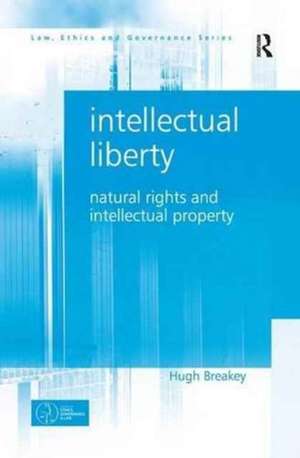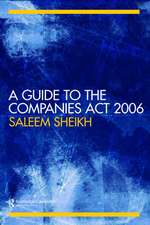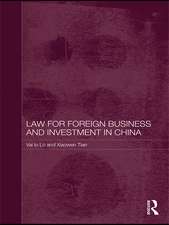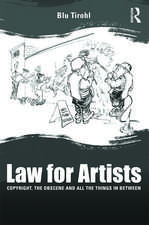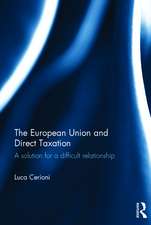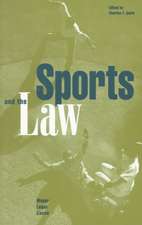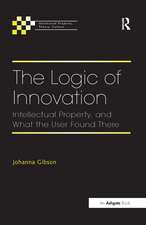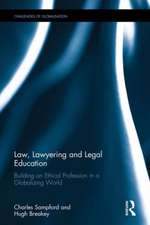Intellectual Liberty: Natural Rights and Intellectual Property
Autor Hugh Breakeyen Limba Engleză Paperback – 17 noi 2016
| Toate formatele și edițiile | Preț | Express |
|---|---|---|
| Paperback (1) | 469.34 lei 6-8 săpt. | |
| Taylor & Francis – 17 noi 2016 | 469.34 lei 6-8 săpt. | |
| Hardback (1) | 1054.58 lei 6-8 săpt. | |
| Taylor & Francis – 15 noi 2012 | 1054.58 lei 6-8 săpt. |
Preț: 469.34 lei
Nou
Puncte Express: 704
Preț estimativ în valută:
89.81€ • 94.00$ • 74.75£
89.81€ • 94.00$ • 74.75£
Carte tipărită la comandă
Livrare economică 31 martie-14 aprilie
Preluare comenzi: 021 569.72.76
Specificații
ISBN-13: 9781138279704
ISBN-10: 1138279706
Pagini: 186
Dimensiuni: 156 x 234 x 10 mm
Greutate: 0.45 kg
Ediția:1
Editura: Taylor & Francis
Colecția Routledge
Locul publicării:Oxford, United Kingdom
ISBN-10: 1138279706
Pagini: 186
Dimensiuni: 156 x 234 x 10 mm
Greutate: 0.45 kg
Ediția:1
Editura: Taylor & Francis
Colecția Routledge
Locul publicării:Oxford, United Kingdom
Notă biografică
Dr Hugh Breakey is a Postdoctoral Fellow at the Institute for Ethics, Governance and Law, and the Key Centre for Ethics, Law, Justice and Governance, at Griffith University, Australia. His research interests include the philosophy and ethical dimensions of property rights, intellectual property, the structure of natural, human and legal rights, classical liberalism, and civilian protection and international law. He has published widely on these and related areas. His current research, as part of a larger international project, and in association with the United Nations University, involves rights-based investigation of international civilian protection norms, including the Responsibility to Protect and International Humanitarian Law. He is a member of the Executive Committee of the Australian Association for Professional and Applied Ethics.
Recenzii
’...provides a valuable new component to the theoretical analysis of intellectual property law... Breakey offers us a conceptual foundation (and terminology) for the articulation of freedoms that are useful beyond the confines of intellectual property.’ The Law and Politics Book Review ’Intellectual liberty is set to become a key reference point in the emerging field of the philosophy of intellectual property. Breakey argues that rather than offering justifications for strong regimes of intellectual property rights, natural rights theories point towards effective and sustainable users' rights. Intellectual property rights do not stand as trumps but as components in systems of rights and liberties, in particular intellectual liberties, such as the freedom to learn about the world and to use what one has learned to inform one's actions. These intellectual liberties frame and cabin the reach of justifiable intellectual properties. Breakey's argument is made with care, sophistication, clarity, and verve.’ Lionel Bently, University of Cambridge, UK
Cuprins
List of Cases, Hugh Breakey; Preface, Hugh Breakey; Chapter 1 Introduction, Hugh Breakey; Chapter 2 Principles of Justified Acquisition and Duty Imposing Powers, Hugh Breakey; Chapter 3 Internal Restrictions on Natural Intellectual Property Rights, Hugh Breakey; Chapter 4 User's Rights and the Public Domain, Hugh Breakey; Chapter 5 The Ethical Justification for the Right to Intellectual Liberty, Hugh Breakey; Chapter 6 The Right to Intellectual Liberty in Law, Hugh Breakey; Chapter 7 Conclusion, Hugh Breakey;
Descriere
Considering the steady increase in intellectual property rights in the last century, does it make sense to speak of ’user’s rights’ and can limitations on intellectual liberty be justified from a rights-based perspective? This book philosophically defends the importance of the public domain and user’s rights through the use of natural-rights thought. Utilizing primarily the work of John Locke, it contends that considerations of natural justice and human freedom impose powerful constraints on the proper reach and substance of intellectual property rights, especially copyright.
